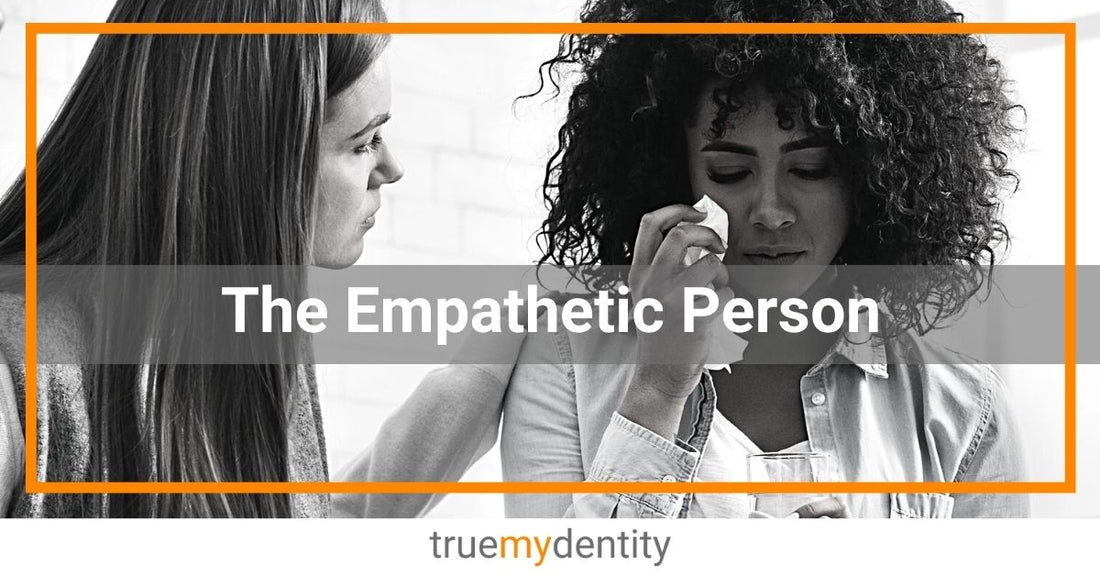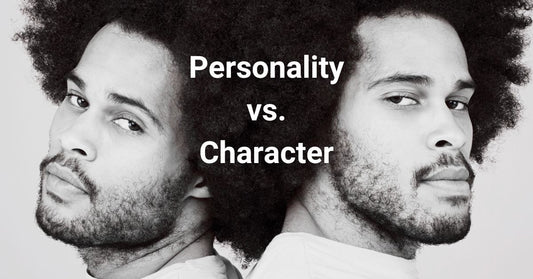
The Empathetic Person | 7 Tips on How to be More Empathetic
Luke FeldbruggeShare
The empathetic person is one who has a strong ability to understand and share the feelings of others. The empathy power they possess is a key aspect of emotional intelligence and involves being able to put oneself in someone else’s shoes and feel what they might be feeling, AND it also involves how oneself then responds to that person. This ability lends itself well to building strong relationships with partners, family members, friends and coworkers. In this post we look at what it means to be empathetic; why empathy is important, and how it can be helpful in your life. And, if you’re looking to improve your ability to show empathy, we provide seven useful tips on how to be more empathetic.
What Does it Mean to be Empathetic?
Merriam-Webster's EMPATHETIC definition is (plus we spice it up a bit): involving, characterized by, or based on empathy; having the ability to imagine, understand or share in how someone else feels.
True Mydentity prefers to add a little more flavor to that meaning of empathetic. Here are some valuable ways the empathetic person may use their power:
Active Listening - When a friend is upset, they pay close attention to what their friend is saying, making eye contact, and actively engaging with their friend by asking questions, and reflecting back some of what they heard to show they understand. Then they likely assist the friend in working through their feelings.
Provide Support - When a coworker is going through a tough time, they express compassion by offering words of encouragement and support, if possible they may offer to assist, and at a minimum they will continue to check in to see how they're doing.
Understand Someone’s Perspective - An empathetic person has the ability to better understand why someone has different political views, beliefs or values. This gives the empathetic person the opportunity to engage in respectful discourse; to listen and learn, and better understand the other person’s point of view. This quality lends itself well to having meaningful, and valuable conversations. Great learning and respectful resolve can be a common outcome of conversations like these.
Complete our free questionnaire and find out if being empathetic is one of your most dominant character traits, and which of the other 58 traits are also your most powerful qualities.
Why is Empathy Important?
Empathy is an important aspect of human relationships and can have a significant impact on personal and professional interactions. By developing empathy, one can improve their emotional intelligence, deepen their connections with others, and improve their professional and personal relationships. Here are some specific reasons why empathy is important to have and practice:
Being Empathetic Can Help You Learn
Why is empathy important in helping you to learn? There are many ways being empathetic can help you to learn. It can improve your interpersonal skills, helping you to understand and connect with others. When the empathetic person understands the perspectives and feelings of the people in their life, they may be more motivated to engage in learning activities and experiences to further discover their potential. And, being empathetic helps you regulate your emotions and respond to stressful situations in a healthy way. So how you approach that impossible test at school or the never ending project at work becomes more manageable and less daunting.
Being Empathetic at Work Can be Good for the Job
Why is empathy important at work? Empathetic employees have the ability to build strong relationships, respond effectively to challenging situations, and can help to improve the overall team performance in the workplace. With strong interpersonal skills, the empathetic person can typically connect well with their coworkers, supervisors and clients. This helps to develop and maintain better communication, more effective collaboration, and a productive work environment.
Empathy helps a person to understand the emotions of others, but also to manage their own emotions responsibly. Being empathetic at work helps to manage stress; where one’s responses to challenging situations are done calmly and in a professional manner. This is a wonderful skill if working in collaborative environments or handling the needs of customers, especially when something goes wrong. It can be key to more positive interactions and building deeper trust and loyalty.
How Being Empathetic Can Affect Relationships
Why is empathy important for relationships? Being an empathetic person can have a significant impact on how new relationships are built; maintaining good relations with your partner, family, friends or coworkers; and keeping long-term relationships healthy, strong and engaging.
Increases Understanding - If you can better understand a person’s current position and perspective, and have a good sense of how they feel about it, this helps you to engage and communicate with this person in a deeper, more understanding way. Offering support, encouragement and compassion when needed helps to build trust, loyalty, and depending upon the type of relationship; a stronger loving connection.
Better Conflict Resolution - When you understand more about the situation, the people involved, and their perspectives (including your own); you can better understand the more appropriate way to react. Having empathy allows you to constructively navigate the different perspectives and the emotions behind them to resolve disputes in a healthy and productive manner.
Combine those two things and that’s how empathy can help build strong, valuable, long lasting relationships. It breaks down walls between people. It shows someone there’s another person who is at least willing to try and understand them, and if necessary, find a solution to an issue together. Remember relationships are a two way street and to make empathy part of your relationships, it works best when there is a give and receive arrangement between empathetic people. Or, between two people who have agreed to prioritize and try to be more empathetic toward each other.
7 Tips on How to be More Empathetic
Empathy is a complex and multifaceted skill that can take time and patience to develop. Learning to be empathetic is not necessarily easy, but it is a valuable and worthwhile skill to have. It takes will power and practice to become more empathetic because it involves being more compassionate, sympathetic and understanding. And frankly, some people find those things to be challenging.
However, by being intentional and making a deliberate effort to be more empathetic, individuals can experience improvements in learning to be empathetic over time. Here are seven tips on put empathy into practice and how to be more empathetic:
- Practice Active Listening - Pay close attention to what others are saying and avoid interrupting. Ask questions to show you are interested and try to understand their point of view. For example, when talking to a friend who is upset about a problem at work, empathetic people will actively listen to what they are saying, acknowledge their feelings, and ask questions to understand their perspective.
- Put Yourself in Their Shoes - Try to imagine how you would feel in the same situation faced by someone else. For example, if a fellow coworker is stressed about a project, try to imagine how you would feel in their shoes. It may provide a great opportunity to offer some support or perspective. Or maybe they just need to vent and get their frustrations out, and you gave them a safe environment to do it.
- Practice Mindfulness - Focus on the present moment. Cliche, right? But it helps to quiet your mind of some of the chatter and distractions while it questions the past and future. Be aware of your emotions AND the emotions of others around you. Observe your surroundings, notice the sights, sounds and smells around you. Scan your body from head to toe and pay attention to any areas of tension or discomfort. Be kind and compassionate to yourself, practice mindful breathing techniques and take some time to reflect on your own experiences and emotions throughout the day.
- Improve Emotional Intelligence (EI) - Emotional Intelligence refers to a person’s ability to recognize, understand and manage their own emotions; as well as to recognize and understand the emotions of others. To improve your emotional intelligence, practice self-awareness and pay attention to your emotions. Notice the triggers that cause you to feel certain emotions and how you respond to them. Develop strategies to manage your emotions like deep breathing, mindfulness or reframing negative thoughts. And if you’re serious about improving your emotional intelligence, check out some books and learn more about it. Attending a course or seminar may be a helpful and valuable investment.
- Learn About Different Cultures - To become a more empathetic person, expand your knowledge and understanding of different cultures’ history and traditions. Read books or articles, watch documentaries, or attend cultural events to learn more about different cultures and their perspectives. This will begin to open your mind to how others live.
- Volunteer and Give Back - Volunteering is an excellent way to develop empathy, as it exposes you to diverse experiences and perspectives. You can engage with people from different backgrounds, cultures and life experiences; and gain greater understanding of the challenges and opportunities faced by others. Volunteering often involves working on projects that directly benefit others, so you’re able to see first hand the positive impact of your own actions and how powerful they can be. It also can help you appreciate your blessings a little more when you recognize the challenges faced by others.
- Show Gratitude - Express appreciation and thankfulness for others and their contributions to your life. Take a moment to thank a coworker for their help on a project or express appreciation for a friend who has been there for you.
Empathetic - True Mydentity Style
True Mydentity offers designs on our clothes that highlight 58 positive character traits. The powerful empathetic trait is one of the 58 character traits featured. We believe if you know your dominant positive characteristics; focus on what you do to learn, work and build relationships using these dominant traits; you will feel more fulfilled and closer to your purpose. And as you improve upon leveraging these positive character traits in those three areas of your life; you move toward discovering your full potential.
If being empathetic is your thing, make True Mydentity’s Empathetic apparel part of your character’s power suit; and be the empathetic person you’re meant to be.
VIEW EMPATHETIC APPAREL COLLECTION >>
Complete True Mydentity’s FREE questionnaire and find out which of the 58 traits are your most dominant.



